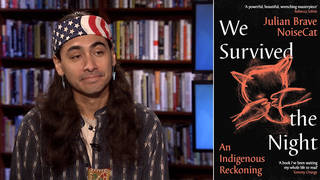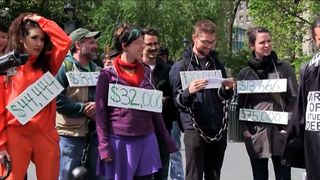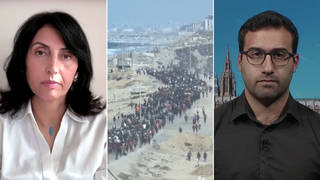
Topics
Guests
- Danny Schechterjournalist and media critic. His latest film is In Debt We Trust: America Before the Bubble Burst.
We take a look at a new documentary by veteran journalist and media critic Danny Schechter called “In Debt We Trust: America Before the Bubble Burst.” The film shows how “the mall replaced the factory as America’s dominant economic engine and how big banks and credit card companies buy our Congress and drive us into what a former major bank economist calls modern serfdom.” [includes rush transcript]
Transcript
AMY GOODMAN: We’re talking to Keith Ernst, senior policy counsel for the Center for Responsible Lending in Durham, North Carolina. We’re also joined in studio by filmmaker and journalist Danny Schechter, who has a new film called In Debt We Trust. Your response to the subprime lending and this unprecedented number of foreclosures in the country?
DANNY SCHECHTER: You know, Amy, when we talk about this, I think of a phrase we used to use back at ABC when I worked there, it’s called ”MEGO,” and that refers to “my eyes glaze over.” Whenever people hear about economic issues, they sort of tune out, because it sounds very complicated. What this reduces itself to is a crime. We’re talking about a crime — CSI, crime scene — and we’re part of this crime scene. We’re talking about a cesspool of corruption implicating some of the biggest banks and financial institutions in the country, inattention by the regulators. Fifty-two percent of the agencies making these loans are not even regulatable, because they’re not federally regulated organizations. We’re talking about millions of Americans who can’t make their bills, who are squeezed beyond belief.
And this is not just an issue for regulators. This is an issue for progressives to respond to. We need a movement here to try to take up these issues of economic justice in America, because we’re not paying attention to it. And this cuts across racial lines. It cuts across ethnic lines. It cuts across also political lines. We’ve set up Americans for Debt Relief Now, an organization like Bono does in Africa for debt relief. We need it in America. We have a website stopthesqueeze.org, as a way to fight back, as a way for people who are in debt to stop being demonized by the media, which is what’s happening now, and to be recognized as the victims they are.
AMY GOODMAN: Danny, we’re going to lose our satellite in Durham, North Carolina, and I just wanted to ask our guest there, Keith Ernst, about the federal laws — for example, the possibility of a reintroduction of the Prohibit Predatory Lending Act that was introduced, I think, two years ago.
KEITH ERNST: I think it’s clear that legislation will be introduced in Congress, and we’re hopeful that it will move forward this time. You know, it’s been talked about for years now. And we’re hopeful that this year can be the year that legislation can move forward and help borrowers, because, you know, as your guest there is saying, it’s sorely needed now.
JUAN GONZALEZ: And, Keith, could you talk — because one of the things — those of us who have a little bit of a historical memory on the housing crises in America recall that this country goes through periodic crises on speculation and abuse in housing from the HUD crises of the 1960s, the savings and loans crisis of the '80s, and now we're confronted now in this decade with this huge crisis, and it seems like many of these characters just reappear with new companies and new banks or new lending procedures, but the same kind of scams. What can be done on a more consistent level, as Danny is raising, to be able to protect people who do not necessarily know all of their rights in terms of lending, especially when it comes to homes?
KEITH ERNST: Right, well, I think you’re right that, you know, we’ve seen many episodes in, you know, not-too-distant memory, where mortgage lenders have essentially been betting people’s houses, you know, so that they can make profits. And that’s what ties all of these cycles together, is the mortgage lender says, “Hey! You know, take a loan from me. Don’t worry about it. In two years, if you need to refinance, we’ll be able to get you out of this loan.” And, you know, eventually that house of cards comes crashing down.
Now, moving forward, what can be done? I think, you know, the law should recognize the reality. Borrowers look to the person sitting opposite them at the table — most, usually nowadays, in subprime market, a mortgage broker — as an expert, as someone who’s helping them pick out their best mortgage. Sadly, this often could be — you know, could not be further from the truth. And so, what the law should do is recognize what borrowers expect and need, which is that the person who’s helping provide them a mortgage actually do just that: help provide them a mortgage that meets their needs.
AMY GOODMAN: Keith Ernst, we’re going to leave it there. I want to thank you for being with us. We’ll link to your website at the Center for Responsible Lending, speaking to us from Durham, North Carolina. Juan?
JUAN GONZALEZ: As we continue to look at the issue of subprime loans and debt, we turn to a new film by Danny Schechter called In Debt We Trust: America Before the Bubble Burst. This excerpt of the film looks at the prevalence of predatory lenders in the subprime industry.
RONALD SILVERMAN: The severity of the problem of home mortgage lending in a predatory way may be quantified in the following terms. You are talking in recent years of a problem that every year transfers hundreds of billions of dollars from the —
DANNY SCHECHTER: Hundreds of billions?
RONALD SILVERMAN: Hundreds of billions of dollars.
DANNY SCHECHTER: You said “billions”?
RONALD SILVERMAN: I said “billions,” not “millions,” from the pockets of the poor to people who are far better position than their so-called victims.
DANNY SCHECHTER: That’s what happened to the Fayez family. They trusted one of these scammers who demanded their house deed when they took out a loan. The family was soon dispossessed and out on the street. Their ordeal was so shocking that it made the newspapers.
MICHELL FAYEZ-OLABI: When the marshal came, my children was having lunch on a Wednesday, the coldest day in January, and said, “You have 10 minutes to leave.” My children have suffered nightmares. My son Daniel would hide under a seat of the car when he will see a police officer. You know, they still remember what they were having for lunch, what they had in the microwave that was left there. They could not even pack their things.
Here I am, a hard-working mother of four at the time, not wanting to go on welfare — sure, they will pay a rent for us, then give us food, but that’s not our ambition — wanting to keep our house as an inheritance for our children. It’s not something wrong. And we weren’t well educated as to how swift and conniving these people are.
DANNY SCHECHTER: That’s what happened to Mary Paskiewicz. She teared up as she told me her story in front of the home she grew up in in South Philadelphia. She lost it to a fraudulent home improvement scam.
MARY PASKIEWICZ: It was very hard. I lost my father in this house. It upsets me, upsets me immensely. I haven’t been back around here for a while.
DANNY SCHECHTER: This is your place still, in your heart?
MARY PASKIEWICZ: Yeah. Yeah. It is. My father died in this house, and he never wanted me to lose it. And I feel like I failed him, too.
AMY GOODMAN: An excerpt of In Debt We Trust: America Before the Bubble Burst. The film was directed by Danny Schechter, “the News Dissector,” a veteran journalist, and he’s also a media critic and co-founder of mediachannel.org, one of the largest online media issues networks. He has more than 20 films to his credit. Danny joins us now in our firehouse studio.
Danny, talk about these people and the broader context in which you did this film.
DANNY SCHECHTER: What I tried to do in the film is link the stories of the victims, of the people who are suffering, of whom there are now millions in America. This is a new Katrina — let’s think of it that way — a disaster affecting low-income people, but also increasingly middle-income people as the income divide in America grows. The housing crunch is now spilling over into other parts of our lives. $25,000 on average is what students leave college with with loans and debts. People are paying, in the last year, some $65 billion just in late fees and interest payments on credit cards. This is a kind of a vacuum cleaner into your pocket and taking your money and swinging it over into Wall Street so that Goldman Sachs can give out, you know, $16 billion Christmas gifts to its employees. It’s blatant, it’s obscene, and it’s dramatic, and it’s institutional. And this is what we have to realize.
We talk about financialization, which is like the loan and credit complex, very much like the military-industrial complex, that has emerged in this country, structured around big banks and credit card companies who are making large profits in the market and from us as consumers without very much scrutiny, in part because they spend $5 billion a year marketing. You watch the Super Bowl, you see all the great spots for Visa and MasterCard. They’re pervasive in the media, and the media is not doing a very good job of offering analysis.
I mean, the sort of stories Juan has been doing in the Daily News, really going into the neighborhoods, very few and far between in what we see in our media about this problem. That’s because America has shifted from a country that made things to a country that buys things. The factory used to be our icon of economic progress. Today, it’s the mall. And as a result, people are encouraged to shop 'til they drop: “We'll lend you the money upfront.” And, of course, the piper has to be paid at the end of the day.
And that’s why I made this film, because I began to realize, like, my savings was dribbling away. And, lo and behold, America’s savings rate is at below 5 percent. In other words, nobody has savings anymore. It’s almost like the recession or depression levels, and there are a lot of very serious people who are warning of a repression — a recession, rather; we have a repression — a recession, and worse, as a result of these trends. That’s why this issue has to be one to be organized around. It’s a struggle to try to get a film out that challenges really the center of power in America: financial power.
JUAN GONZALEZ: And, Danny, even on the issue of housing, the equity that people build up in their houses is constantly being attacked by people who want you to take out loans based on the value of your house, but that assumes obviously that real estate values will continue to go up when they don’t necessarily do.
DANNY SCHECHTER: Well, our homes have become ATM machines. You know, we’re basically taking money out in equity until there is no more money to be taken out, and now it’s impacting on, you know, high-income people, as well. The New York Times on Sunday said because of this whole crisis, the lenders are tightening up on criteria to buy, you know, million-dollar condos and the rest, and housing is slowing in New York. A lot of people can’t sell their homes the way they thought they would. You know, in New York and around the world — around America, anyway — reality is spelled “realty” for most people. That’s what they talk about — their apartments, how much they’re worth — endlessly, endlessly, endlessly. Well, what happens when that value is gone or when you don’t have easy access to a market or people who want to buy your homes? You’re in trouble.
JUAN GONZALEZ: I’d like to ask you for a second about the college loan situation. Recently in New York state, the new attorney general, Andrew Cuomo, went after some major universities. It turns out the universities were not only hooking up special deals with lenders, but were getting kickbacks by the volume of loans that they were able to direct to their students to particular lenders.
DANNY SCHECHTER: Well, there’s a lot of collusion here, you know, between the universities and the lenders, because there’s a way to raise money for the university.
When I was at the Rochester Institute of Technology, I went to a lecture by Dr. Robert Manning, who wrote a book, Credit Card Nation, detailing this problem. And just outside his lecture hall, I went to the bathroom. I went outside, and I said, “Oh, my god! The banks have all set up tables, and they’re signing kids up for credit cards and for accounts right here on the campus.” And we went out, took our cameras out of the presentation, and we took it next door, and we saw this process at work.
You know, all these kids, they want what everybody else has. They want to shop at the Gap. They want the nicest and the best and everything else. And they run up tremendous credit card balances, and then they can’t pay. And we have not only suicides being reported of young people in despair over all of this, but kids leave school, and what do they do? They have to find the first job they can to pay back. They can’t come and volunteer at Democracy Now! or mediachannel.org, because they have to pay off their loans. So their options, their life options, are being impacted by this, as well. That’s why this debt problem is not just an economic issue, not just affecting housing, but affecting our whole society.
In our film, In Debt We Trust, we look at the bankruptcy bill that sailed through Congress with bipartisan support — Democrats and Republicans — supporting this measure. And this is why, after Katrina, we found out — guess what? — the people in New Orleans couldn’t file for bankruptcy when they lost their homes, because floods had been taken out of the bill as a basis, you know, for relief.
AMY GOODMAN: Danny, you also talk about scamming soldiers.
DANNY SCHECHTER: Yes, indeed. You know, 100,000 veterans coming back from the Iraq war are in debt, and they’re dealing with these payday lenders. We were down in Norfolk, Virginia, around a naval base there. Last year, there had been three payday lenders. There are now 36 or 26 payday lenders and loan stores and what have you. People are going into hock, and they don’t know how to get out of it. And we’re talking about large numbers.
You know, I was given access by the Naval and Marine Corps Relief Society, not people I usually hang with, you know, because they want to call attention to this problem. And it affects everybody. That’s why it’s an issue that we should organize around. I reached out to MoveOn. I said, “Get involved on this issue, because it’s a way of bringing people together.” We need common ground issues that can unite Americans for economic justice, and we’re not seeing that happening. As factories close, as people lose their jobs, this credit crunch is really driving and taking away their assets. That’s why In Debt We Trust is a very important film, I believe.
AMY GOODMAN: Well, Danny, are you using your film as an organizing tool. It’s opening here in New York. Where tonight?
DANNY SCHECHTER: Here it is, Amy. This is the actual DVD, which is out. We have a website indebtwetrust.com and stopthesqueeze.org. We’re trying to run a campaign alongside the film to get people active, a little bit the way Robert Greenwald did with his Outfoxed movie. But we’re trying to take it one step further and actually organize people and encourage them to organize. We have all the major groups, like the National Center for Responsible Lending and ACORN are in the film and other organizations, NEDAP here in New York —
AMY GOODMAN: And it’s opening tonight at the Quad —
DANNY SCHECHTER: Tonight at the Quad Cinema —
AMY GOODMAN: — in New York City.
DANNY SCHECHTER: Thirteenth Street, 7:50. Tomorrow night, 7:50 p.m. at the Quad. Please come. Please tell your friends.
AMY GOODMAN: Well, Danny, we want to ask you to stay with us, as we’re going to move to another issue after break. We’re going to be speaking with the freed journalist Josh Wolf. He’ll join us from San Francisco. Danny Schechter, “the News Dissector,” his film is called In Debt We Trust: America Before the Bubble Burst.











Media Options